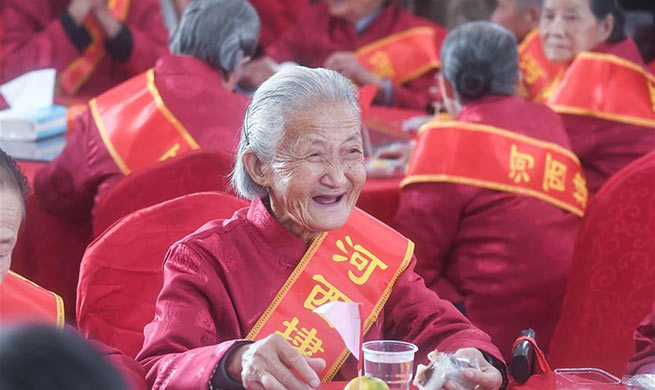SHANGHAI, Oct. 17 (Xinhua) -- The latest report released by Shanghai Civil Affairs Bureau said that the eldest person in the municipality was 111 years old, and the centenarian population increased to nearly 2,300 as of Sept. 30.
Shanghai is a city of longevity with the rate of centenarians in every 100,000 people reaching 14.9 in 2017. There was only one centenarian in Shanghai in 1953, but the figure exceeded 1,000 in 2011 and surpassed 2,000 in 2017.
Among the centenarians, women account for 75 percent. Those aged between 100 and 102 take up 82.9 percent of the total.
Fei Henian, 101, and his wife Xu Manqian, 100, are the city's oldest couple.
Living in the downtown area of the bustling city, the old couple said they had been pursuing a healthy lifestyle and set daily schedules for meals and sleep. For instance, they eat their breakfast, lunch and supper strictly at 7:30 am, midday and 6 p.m. everyday.
Remaining in a good relationship and staying positive are also keys to longevity, the couple said.
As one of the most rapidly aging cities in China, Shanghai is home to nearly 5 million people aged over 60, accounting for 33 percent of its entire population.
In China, more than 240 million people were aged 60 or above by the end of 2017, or 17.3 percent of the total population. The figure is expected to reach 255 million by 2020.
OLD BUT COLORFUL
Since China has been making efforts to improve the elderly care services across the country, the health of the elderly has been greatly enhanced over the past few years.
Despite disparities in income, the country's healthcare covers over 98 percent of elderly people living in urban and rural areas in 2015.
More and more senior citizens now care more about their spiritual lives. Different from the traditional idea that the elderly are boring and lonely, they have made their lives more colorful.
"Do you want to take a spur-of-the-moment trip? Join me," said Zhang Weili, 56, on WeChat, China's popular instant messaging platform, before the seven-day National Day holiday.
"I got quite a lot of responses from my aged friends. We are classmates at an elderly college. Convening a trip through WeChat has become very popular among us," Zhang said.
Zhou Huaixian, in his 60s, started to travel around the country after retirement. "I shared interesting stories along my journeys on WeChat. Travel make me feel happy and shortens the distance between me and my daughter. I have become very young and posh now."
According to The Survey Report on the Living Conditions of China's Urban and Rural Older Persons (2018), published by Social Sciences Academic Press in May, more than 14 percent of elderly people in China traveled in 2015, with an average spend of nearly 5,000 yuan per person.
The figure has been increasing in recent years, and more than 22 percent of elderly people plan to travel or consider traveling next year.
The emerging elderly education industry also reflects the diverse demands of the elderly in China.
There are at least 70,000 colleges accommodating more than 8 million older people in China, who prefer to learn new skills and knowledge instead of killing time at home.
The famed Shanghai University for the Elderly has nine departments covering calligraphy and painting, foreign languages, computing, history, housework and music. Among the nearly 10,000 senior students, computing, English and music are the most popular subjects.
New consumption patterns have also showed changes in older people's lives. As more older people have access to the Internet, a growing number spend more time reading the news, watching TV series, playing online games and investing in stocks. Around 12.4 percent of the elderly buy products online, according to the report.
"I've downloaded various apps on my phone. I can shop, take photos, film short videos and share them with my friends and family anywhere I am," said an 80-year-old woman surnamed Mei, who lives in central China's Hunan Province.
"New technology enriches older people's lives, the 'empty-nest' elderly in particular. It can provide supplementary methods of socializing for them and raise their sense of happiness," said Zhang Xiaohong, an associate professor with the Communication University of China.
China has strove to respond proactively to population aging, adopting policies and fostering a social environment in which senior citizens are respected, cared for and live happily in their later years.
















